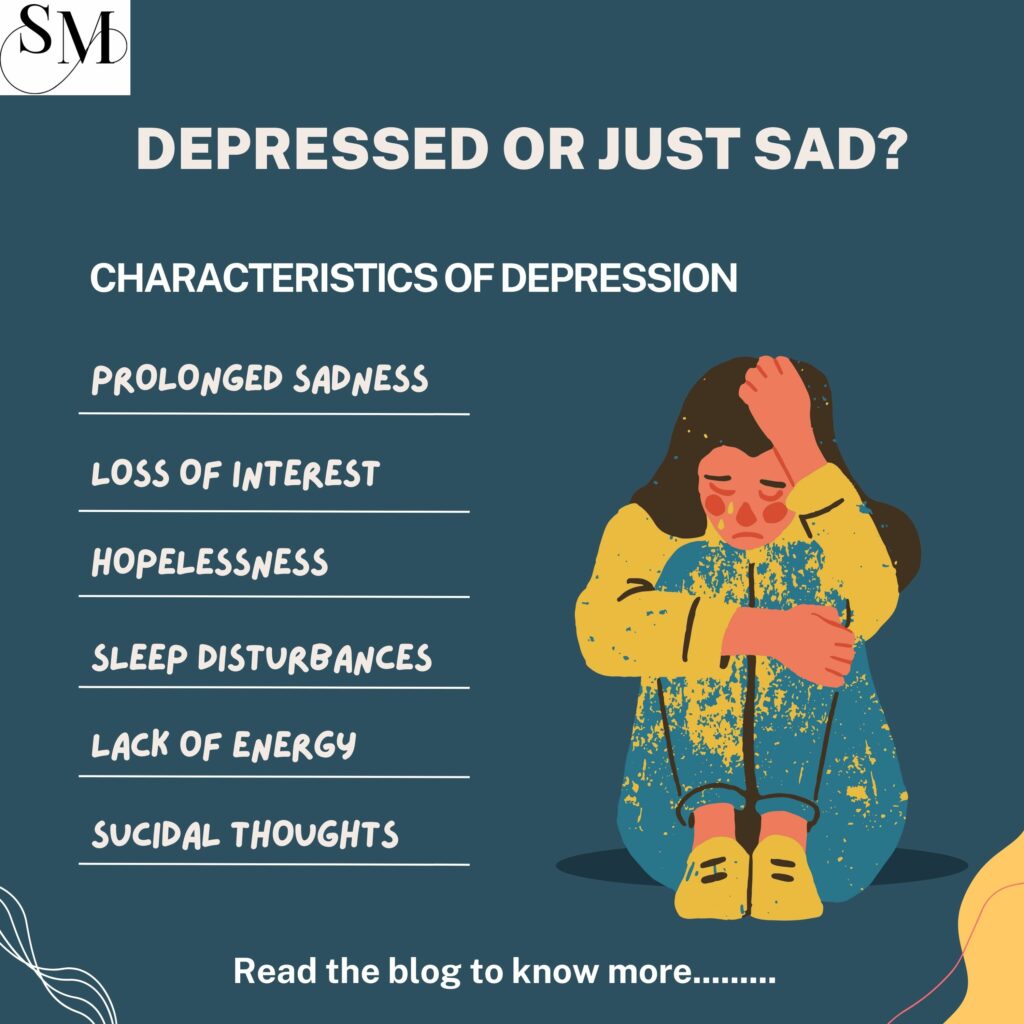We all experience moments of sadness in life, whether due to a challenging situation, the loss of a loved one, or a setback at work. But how can you tell if what you’re feeling is just sadness or something more serious, like depression? Understanding the difference between sadness and depression is crucial in determining the best path forward for your mental health. In this blog, we’ll explore the key differences, symptoms to watch out for, and how to seek help if you think you might be dealing with depression.
What is Sadness?
Sadness is a natural, temporary emotional response to events that cause pain or disappointment. It’s a part of the human experience and something everyone feels from time to time. For example, you might feel sad after a breakup, a bad day at work, or when a close friend moves away. The important thing to remember about sadness is that it’s usually short-lived and linked to a specific cause.
Common characteristics of sadness include:
- Temporary feeling: Sadness often resolves on its own with time.
- Linked to an event: There’s typically a clear cause for why you feel sad.
- Emotionally connected: Despite feeling down, you can still experience positive emotions, like joy, when something good happens.
- Normal part of life: Sadness is a natural emotional response to difficult situations.
What is Depression?
Depression, on the other hand, is a mental health condition that goes beyond occasional sadness. It is characterized by a persistent feeling of sadness or hopelessness that can last for weeks, months, or even years. Depression affects your overall functioning, making it difficult to enjoy activities you once loved, focus on tasks, or maintain relationships. It’s not something you can “snap out of” without professional help.
Key characteristics of depression include:
- Prolonged sadness: The feeling of sadness lasts longer than two weeks and doesn’t improve with time.
- Loss of interest: You may lose interest in activities you used to enjoy, like hobbies, socializing, or even eating.
- Physical symptoms: Depression can manifest in physical ways, such as fatigue, sleep disturbances, and changes in appetite.
- Hopelessness: A sense of despair or worthlessness that permeates your thoughts and outlook on life.
- Difficulty functioning: Depression can interfere with your ability to work, maintain relationships, or manage daily responsibilities.

Symptoms of Depression
While sadness and depression share some similarities, the intensity and duration of the symptoms of depression are more severe. Here are common symptoms to look out for:
- Persistent sadness or low mood for most of the day, nearly every day.
- Loss of interest or pleasure in activities that once brought joy (anhedonia).
- Feelings of hopelessness, worthlessness, or guilt.
- Sleep disturbances, such as insomnia or oversleeping.
- Fatigue or lack of energy, even when well-rested.
- Difficulty concentrating, thinking, or making decisions.
- Significant weight loss or gain unrelated to dieting.
- Physical symptoms, like headaches, digestive issues, or chronic pain without a clear cause.
- Thoughts of death or suicide.
If you experience several of these symptoms for more than two weeks, it’s possible you are dealing with depression and should consider seeking professional help.
Sadness vs. Depression: Key Differences
One of the main differences between sadness and depression is how long the feelings last and their intensity. Here’s a quick comparison:
| Sadness | Depression |
| Temporary emotional state | Long-lasting mental health condition |
| Triggered by a specific event or situation | May not have a clear cause |
| Resolves on its own with time | Persists for weeks, months, or longer |
| You can still enjoy happy moments | Loss of interest in almost all activities |
| Doesn’t interfere significantly with daily life | Interferes with work, relationships, and daily functioning |
Types of Depression
Depression isn’t one-size-fits-all. It comes in different forms, each with its own symptoms and challenges. Here are some common types:
- Major Depressive Disorder (MDD): Characterized by a constant feeling of sadness, loss of interest in activities, and difficulty functioning. MDD is the most commonly diagnosed form of depression.
- Persistent Depressive Disorder (Dysthymia): A milder but more chronic form of depression that lasts for at least two years.
- Seasonal Affective Disorder (SAD): Linked to seasonal changes, usually occurring in winter when there is less natural sunlight.
- Postpartum Depression: A type of depression that occurs after childbirth, affecting a new parent’s ability to care for their baby.
- Bipolar Disorder: Involves cycles of depression followed by periods of mania or elevated mood.
When to Seek Help
If you’re unsure whether you’re just sad or dealing with depression, it’s always a good idea to talk to someone—a friend, family member, or a mental health professional. If your feelings of sadness are overwhelming, persistent, and affecting your daily life, you may need help managing depression.
Here are a few signs that it’s time to seek professional help:
- You’ve felt consistently sad for more than two weeks.
- Your symptoms are interfering with your ability to work or maintain relationships.
- You’re experiencing thoughts of harming yourself or suicide.
- You’ve lost interest in activities that once made you happy.
- You’re using substances like alcohol or drugs to cope with your emotions.
Final Thoughts
Understanding the difference between sadness and depression is key to taking control of your mental health. While sadness is a normal and temporary emotion, depression is a serious condition that requires attention and care. If you think you may be dealing with depression, don’t hesitate to reach out for help. There are many treatment options, including therapy, medication, and lifestyle changes, that can help you manage your symptoms and start feeling like yourself again.
If you’re struggling with persistent sadness or depression, don’t hesitate to reach out for help. Talking to a mental health professional can provide you with the guidance and support you need. If you need help, you can talk to Surbhi Manocha, a renowned counselor in Meerut, who can offer personalized support and strategies to help you navigate your mental health journey.
